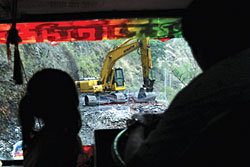 KIRAN PANDAY |
From the mountains of Dolakha to the central hills of Arghakhanchi and out in Kailali in the far-west, political uncertainty following the resignation of the Maoist-led government last month has created a power vacuum in which plundering budgets and corruption have become the norm.
Maoist cadre, aided and abetted by a menacing YCL, now monopolise all district and village-level contracts for everything from new roads to boulder and sand mining and even the trade in stolen cars and wildlife contraband from India. No private contractor anywhere can get away without handing over a 'PC' (per cent) to local Maoist party bosses.
"It's now standard operating procedure in the New Nepal," says a private contractor based in Surkhet wryly, "we factor the protection money into our budgets." In many places the construction, bridges, highways and hydropower projects have been halted because of extortion.
Even in districts where local councils had been set up in the last elections, the Maoists backed out of agreements after their government fell. In districts like Lamjung, local councils have not been set up at all so development plans and budgets for the coming year have been languishing. Local civil society is trying to get the parties to work together, but so far unsuccessfully.
"The discussions are all about who gets what share of the development budget, and they can't agree on a formula," said one exasperated activist in Besisahar.
In the past, even if political parties quarreled in Kathmandu, local bodies somehow kept functioning. Many village elders elected to VDC councils from the last local elections in 1999 took charge of development activities. Now, even that mechanism is not working as political parties compete to steal from the development budget for personal gain or to replenish party war chests.
When the district council in Dailekh found it had Rs 10 million in unspent development funds, the three main political parties divided it among themselves. In Ramechhap, there is a frenzy of road-building as political parties award themselves contracts. Rival parties sometimes build duplicate roads to the same village. The roads are built with no regard to engineering or the environment and most will not survive the coming monsoon (see box). The local NC committee has actually split in Dolakha over a Rs 3.5 million road contract because of rivalry between fellow kangresis.
CDOs and district police chiefs are demoralised, as Maoist cadre publicly abuse and threaten them. In Tanahu, a district administration official says he has given up trying to work with the political parties. He told Nepali Times: "What can I tell you? We have a three-party dictatorship. They decide on the budget and divide it up. There is no accountability, and no one dare ask questions. We are helpless and hopeless."
Even in districts like Gorkha where former finance minister Baburam Bhattarai lavished cash in his home district to build roads and upgrade colleges, there is little accountability. "I have seen one crore being given to a friendly contractor to build a highway culvert," recalled a local journalist, who added investigating such stories would be suicidal.
To be sure, pork-barrel politics was the norm also with the NC and UML. But local officials interviewed in districts across Nepal in the past month confirmed that the Maoists are different because of their use of threats and violence. "They beat up rival contractors in front of the police station, and police can't do a thing," an NGO activist in Hetauda told us. Indeed, parties mobilise goons from Kathmandu when tenders for contracts are opened and beat up rivals if they don't get it.
"So this is why we fought a 10 year war in which 14,000 people were killed: for thekka patta," said a district development officer in Charikot this week, using the Nepali phrase for 'contracts'. "They have forgotten it was all supposed to be for the people."
'Dozer development
A new landscape feature has appeared right across the mid hills of Nepal in the past two years: lush hillsides scarred by zig-zagging roads. The landslides they trigger tumble down gullies to the valley below.
The road-building spree is a response to local demand. Most villagers in Nepal when asked what their development priority is, immediately reply: "A road." But the frenzy of new construction is also a result of mass-scale corruption. Local political cadre are exploiting the instability and confusion of the past 10 months to misappropriate local development budgets and distribute cash to party faithful.
Most roads are built by overseers with scant regard for environmental norms, ravaging steep slopes and threatening settlements with landslides. Political parties prefer contractors with bulldozers so they can over-invoice or pocket kickbacks. But the machines are much more destructive to the mountains, and in addition take away jobs from villagers. Some donors have actually gifted bulldozers to DDCs in the name of 'development'.
In Dolakha alone, the district spent Rs 40 million on roads last year. Half of that money went to pay for bulldozer rentals. Although they cost Rs 1,700 per hour to rent, records show many were hired at up to Rs 2,400 per hour.
Activists in Charikot have calculated that at Rs 150 per day wage for villagers, the bulldozers cost 5,000 jobs last year. "Most of us are willing to work for free to get roads to our village, but there is too much money tied up in road contracts," lamented one ex-VDC chairman from northern Dolakha.


